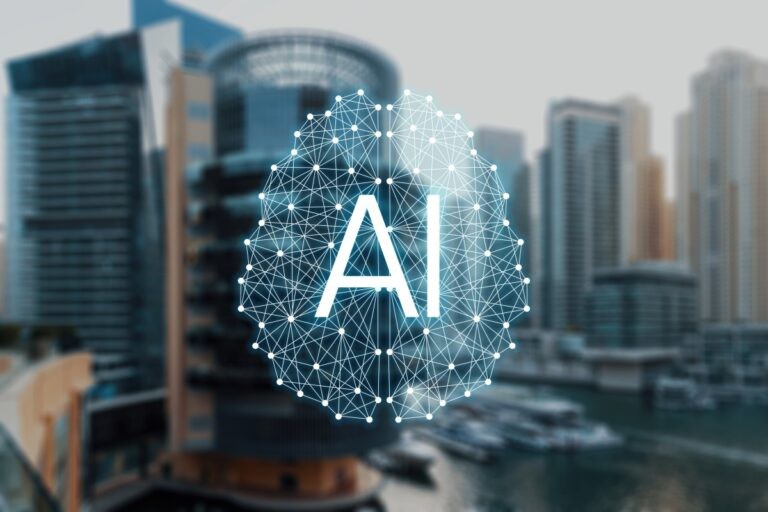AI Uses in North Carolina
AI has the potential to help communities large and small across North Carolina. Communities have the chance to pilot and use AI technologies to increase productivity and save money. Examples include traffic signal management, property appraisal, and gunshot detection.

Artificial Intelligence (AI) is the development and use of computer algorithms to simulate tasks commonly associated with human intelligence, such as reasoning and learning from past experience. Using machine learning and data analytics, AI systems have the ability to learn and adapt based on data patterns without following explicit instructions. ChatGPT, Google Bard, and similar large language model (LLM) chatbots that use generative AI have sparked what some experts are predicting will be the greatest boost in worker productivity since the advent of the Internet by helping users to get informed answers to almost any question quickly.[1]
The Challenge
AI has the potential to help communities large and small across North Carolina. Communities have the chance to pilot and use AI technologies to increase productivity and save money. Examples include traffic signal management, property appraisal, and gunshot detection. Public and private efforts to use AI can be advanced by promoting standardized data and open data, and through making new AI applications open source to support use by others.
In addition, AI provides considerable economic development potential as a job cluster. The Brookings Institution has identified the Raleigh-Cary Metropolitan Statistical Area (MSA) as one of 13 metro areas that are “early adopters” of AI technology and the Durham-Chapel Hill MSA as one of 21 “federal research and contracting centers” for AI (Muro and Liu 2021). Brookings also lists the Durham-Chapel Hill MSA in the top fifteen metro areas for jobs threatened by this technology (Muro, Whiton, and Maxim 2019). With its plethora of data scientists, software engineers, and other professionals, North Carolina is well-positioned to support the continued development of this industry cluster. Retraining workers as needed in industries vulnerable to AI will be important.
However, AI is heightening concerns about cybersecurity, privacy, and discrimination through algorithmic bias. AI applications that live in the cloud often require clients to send data to a third-party service that may have uncertain availability and affordability in the future. Careful review of contractual arrangements is important to protecting client data privacy and ensuring data portability if switching to another service. Some experts believe clients should push for locally controlled AI to help reduce these concerns.[2]

Relevance
Impact: High (AI is rapidly becoming useful in virtually every aspect of daily life)
Certainty: Medium (smaller governments may need less complicated systems but also may have greater resource deficits that AI can help address)
Timeframe: Emerging (widespread use of AI is growing rapidly)
Context: All areas (AI has considerable potential to improve service delivery at all scales and in all communities)
Potential Responses
Short-Term
- Conduct AI strategic planning to identify opportunities for appropriate use in your organization
- Work with vendors to conduct demos to vet new AI applications
- Select promising applications for pilot initiatives
- Coordinate with groups such as C. Local Government Information Systems Association (NCLGISA) and N.C. Office of Privacy and Data Protection to share best practices on AI applications, cybersecurity, and data privacy
Medium-Term
- Scale up successful pilots to the community and regional level
- Promote standardization of local government processes and data to facilitate cross-jurisdictional collaboration and AI applications
- Coordinate actions with those for Smart Communities and Data Access and Equity drivers of change
Long-Term
- Track the growth of the AI business sector
- Host an annual forum on the latest AI applications in collaboration with academic, business, and institutional partners
- Host regional awards program to recognize innovative local government use of technology
- Coordinate with partners to promote AI applications that advance social goods and minimize negative impacts
Key Stats
- ChatGPT is the fastest-growing app in history, reaching 100 million users just two months after launching (The Guardian, 2/2/23).
- Federal research and development expenditures on AI at U.S. colleges and universities grew by 45% in the past decade. Still, they accounted for only 5% of total R&D expenditures at U.S. institutions of higher learning, suggesting this sector is both fast-growing and early in its development (Muro and Liu 2021).
- AI could increase global GDP by up to 14% in 2030—the equivalent of an additional $15.7 trillion—making it the biggest commercial opportunity in today’s fast-changing economy (PriceWaterhouseCoopers 2017).

Example: GovAI Coalition
More than 250 local governments across the United States have joined the new GovAI Coalition, which was established in November 2023 to help local governments shape the development of artificial intelligence in service to society. North Carolina members to date include the Town of Apex, Davie County, the City of Greensboro, Guilford County, the City of Hickory, and the City of Raleigh.
Members commit to a series of guiding principles, which include the following:
- Using AI for social good,
- Ensuring ethical, non-discriminatory, and responsible AI governance,
- Promoting vendor accountability,
- Improving government services, and
- Fostering cross-agency collaboration and knowledge sharing.
The GovAI Coalition and its working groups have prepared a number of resources to help its members use AI effectively and appropriately. These include an AI Policy Manual, AI Incident Response Plan, AI Fact Sheet, Vendor Agreement, Use Case Template, and Vendor Registry. In this way, these organizations are working together to advance the responsible use and development of AI to improve the lives of their constituents while protecting their communities against AI risks.[4]
References
David Wasserman, AICP, and Michael Flaxman. “Artificial intelligence and planning practice.” American Planning Association, PAS Memo No.111, 2022.
Kevin C. Desouza. Artificial Intelligence in the Public Sector: A Maturity Model. IBM Center for The Business of Government, 2018.
Kristi Nickodem and Shannon Tufts. 8/4/23. “ChatGPT and Generative AI: What Do Local Governments Need to Know?”. Coates’ Canons NC Local Government Law. UNC School of Government.
Mark Muro, Jacob Whiton, and Robert Maxim. What Jobs Are Threatened by AI? Better-paid, Better-educated Workers Face the Most Exposure. Brookings, 2019.
Mark Muro and Sifan Liu. The Geography of AI: Which Cities Will Drive the Artificial Intelligence Revolution? Metropolitan Program at Brookings, 2021.
Nicole Turner Lee, Paul Resnick, and Genie Barton. “Algorithmic detection and mitigation: best practices and policies to reduce consumer harms.” Brookings, May 22, 2019.
Thomas W. Sanchez, AICP, PhD. Planning with Artificial Intelligence. PAS Report 604. American Planning Association, 2023.
[1] Personal communication with Hamilton Hitchings, Software Engineer, ChatGPT Developer, 5/25/23.
[2] Personal communication with Dr. Collin Lynch, Associate Professor of Computer Science, North Carolina State University, 5/3/23.
[3] Gates, Joe, Planning Director, Town of Lowell, NC. Webinar Presentation titled “Case Study: Lowell, NC” at Centralina Learns Planning Series: Artificial Intelligence (AI) and Ethics for Planners, Centralina Regional Council, 12/12/23.
[4] GovAI Coalition. Open Letter, March 13, 2024.
